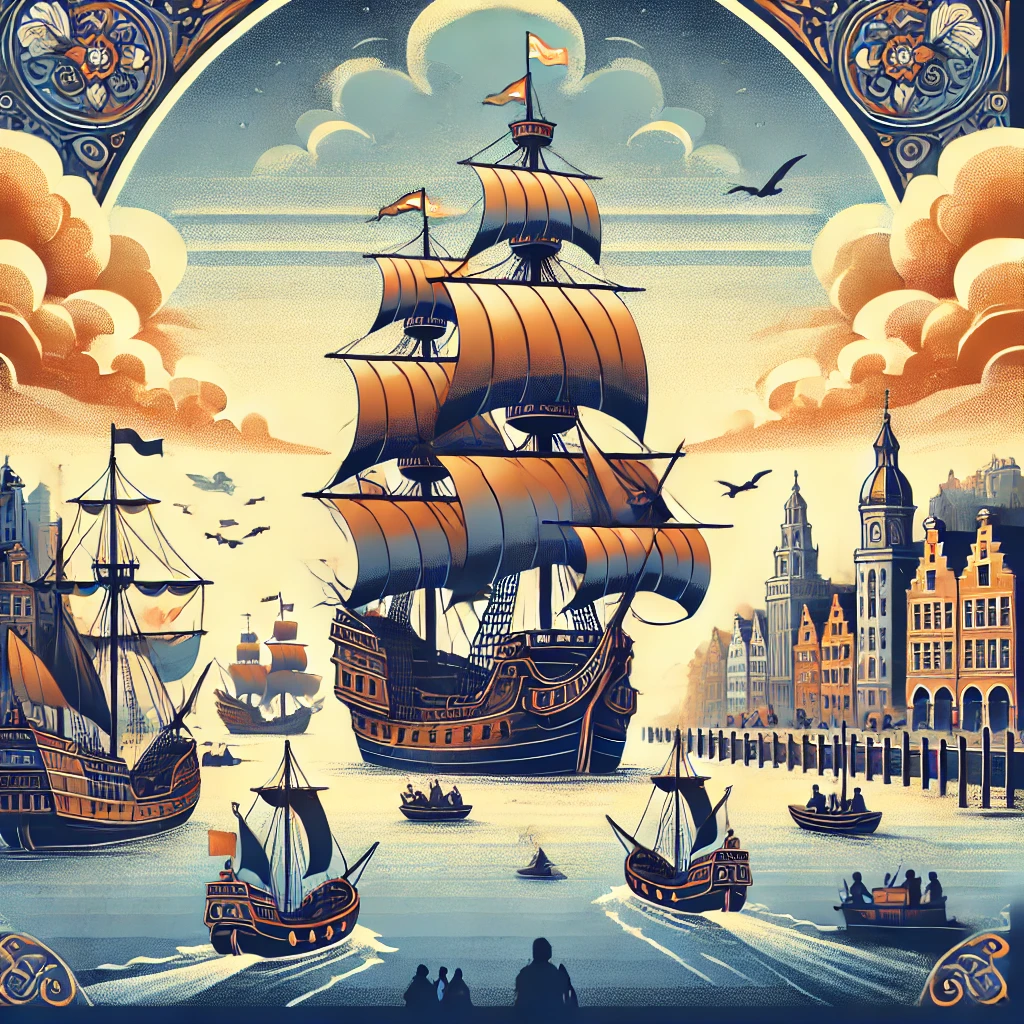Part 1: The Beginnings of a Global Trade Empire
Explore the origins of the Dutch East India Company (VOC), the world’s first multinational corporation. Discover how the VOC pioneered global trade, navigated uncharted waters, and established the foundations of a powerful trade empire in the early 1600s.
Table of Contents
Setting Sail with Ambition
In the early 17th century, as Europe’s obsession with Asian spices grew ever fiercer, the Dutch decided they wouldn’t just play catch-up; they’d dominate. The year was 1602, and the newly formed Dutch East India Company (Vereenigde Oost-Indische Compagnie, or VOC) set its sights on becoming a trade juggernaut. The VOC wasn’t an ordinary merchant’s guild; it was a corporate empire with powers that rivaled any sovereign state. With a fleet of ships, its own military, and authority granted by the Dutch government to sign treaties, wage wars, and establish colonies, the VOC set a historical precedent as one of the first multinational corporations. The VOC quickly became a magnet for investors. Risk-takers, large and small, poured their money into what would become the world’s first publicly traded company, and they reaped the rewards. The VOC issued shares, paid dividends, and even had an official stock exchange in Amsterdam. This wasn’t just trading goods—it was the birth of modern capitalism, and the VOC stood as its shining example. As a joint-stock company, the VOC was less about small risks and more about massive gains. With backing from investors, the company wasn’t shy about wielding its influence. The stakes were high, and the VOC’s directors knew that the prize—control over the lucrative spice trade—was worth every risk they could take.
The Spice Trade: Gold of the East
To the Dutch, spices like cloves, nutmeg, and pepper were treasures more valuable than gold. Sourced from the “Spice Islands” of Southeast Asia (now part of Indonesia), these seasonings could preserve food, enhance flavors, and—most importantly—fetch astronomical prices in Europe. Control the spice trade, and you controlled European markets. And the VOC was determined to do exactly that. Armed with an unshakeable mission, the VOC fleet set sail for the East Indies. Their ships braved treacherous waters, unpredictable weather, and even attacks from rival fleets. Once in Asia, the VOC didn’t just buy spices; they took control of the islands where the spices grew. They established outposts, forts, and even cities, creating a network of influence across the Indonesian archipelago and beyond. The VOC’s aggressive tactics were rooted in pragmatism. If they couldn’t negotiate a favorable deal, they simply brought out the cannons. In regions like the Banda Islands, where nutmeg was abundant, the VOC employed brutal tactics to maintain control. To keep other nations out, they essentially turned Banda into a monopoly by either driving out local leaders or forcing them into contracts they couldn’t refuse.
From Commerce to Conquest
The VOC didn’t stop at trade; they ventured into governance. It wasn’t long before the company evolved from a trader to a full-blown colonial power, wielding authority over the people and land it controlled. By 1619, the VOC had established Batavia (now Jakarta) as its Asian headquarters, a bustling city where Dutch governance, commerce, and military prowess converged. Under the command of Jan Pieterszoon Coen, a fierce and ruthless leader, Batavia became the beating heart of the VOC’s operations in the East Indies. In Batavia, the VOC held not only economic power but also legal and military authority. They enforced Dutch law, levied taxes, and maintained a standing army. The VOC’s soldiers were a mix of Europeans and locals, bound by a rigid command structure that reported to Dutch commanders. Coen’s vision was simple: make Batavia a model of Dutch dominance and prosperity, a center from which they could control all trade in Southeast Asia. He succeeded, but at a significant cost to the indigenous population. With every new fortification and outpost, the VOC’s influence expanded. They were no longer just merchants—they were rulers. The company had the power to shape local politics, dictate trade terms, and impose their laws on foreign lands. While they filled Dutch coffers with profits, their expansion often came at the expense of local communities, who faced harsh treatment and exploitation under VOC rule.
A Monopoly on the High Seas
The VOC’s approach to business was ruthless by design. They sought to build a monopoly over the spice trade by controlling not only the islands where spices grew but also the shipping routes and ports that connected them. They aimed to establish “exclusive contracts” that would limit the sale of these spices to the VOC alone, effectively cornering the European market. The VOC’s primary rivals were the Portuguese and the English, both of whom had already established trading posts in Asia. But the Dutch were prepared to go to war to secure their supremacy. By leveraging their naval might, the VOC pushed out competitors, capturing Portuguese fortresses and outmaneuvering English ships. Through strategic alliances and outright force, they solidified their control, transforming the spice trade into a tightly regulated network that enriched the Netherlands. Despite their success, the VOC’s monopoly required constant vigilance. Maintaining control over distant colonies, defending shipping routes, and securing trade agreements demanded a significant investment of resources. The VOC had to navigate a fine line, balancing the demands of European investors with the realities of colonial administration. The directors in Amsterdam monitored profits closely, expecting continuous growth and returns. And the VOC’s local governors knew they would be held accountable for any loss of revenue.
A Corporate Giant’s Influence on Society
Beyond its role in trade, the VOC shaped Dutch society in unexpected ways. The wealth generated by the company helped fund projects at home, from grand buildings in Amsterdam to social initiatives that elevated the city’s status as a center of global trade. The Amsterdam Exchange became a model for future stock markets, allowing individuals from all walks of life to invest in the company’s success. Even the Dutch language absorbed terms and phrases related to finance and trade, with the VOC as its muse. Back in the Netherlands, the VOC inspired a culture of commerce and exploration. With ships constantly sailing to and from Asia, bringing back exotic goods and incredible profits, the Dutch people grew accustomed to a life enriched by trade. The company’s successes were celebrated in literature, art, and even public events. The VOC’s influence extended beyond economics, embedding itself in Dutch identity. Yet with success came a darker legacy. The VOC’s treatment of indigenous populations and their monopolistic practices led to criticism, both within and outside of the Netherlands. As the VOC’s power grew, so did the debate over the ethical implications of corporate rule. The VOC had become a “shadow sovereign,” a corporate empire with ambitions that often ran counter to traditional values of justice and humanity. In this phase of the story, the VOC is depicted not merely as a corporation but as a corporate shogun, wielding authority with a level of autonomy that blurred the lines between business and governance. Their success relied on a relentless drive for profits and control, a theme that would continue to shape their operations as they expanded their reach even further. In the next part, the VOC’s methods of colonial control intensify, as they enforce their will across the East Indies and deal with new challenges to their power. They continue to shape trade, governance, and even culture, leaving an indelible mark on history that illustrates both the promise and peril of corporate influence on global affairs.
References
-
The Dutch East India Company: A Captivating Guide to the First True Global Corporation by Captivating History
An accessible exploration of the Dutch East India Company’s history and influence. Captivating History
-
Dutch East India Company by Encyclopaedia Britannica
A detailed reference on the VOC’s role in global trade and colonialism. Britannica
-
The Company: A Short History of a Revolutionary Idea by John Micklethwait and Adrian Wooldridge
Examines the impact of the Dutch East India Company on modern corporate governance. Modern Library

